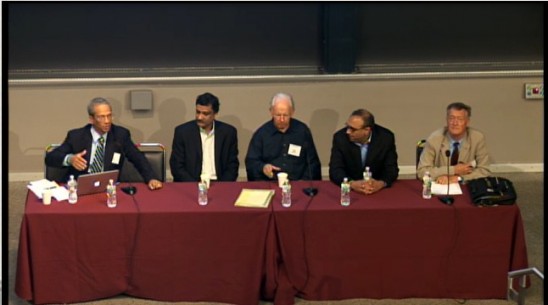 By Jonah Newman. This is the second in a series of posts about the data that are likely to appear in the Obama administration’s proposed college-ratings system. For the first post, about graduation rates, click here.
By Jonah Newman. This is the second in a series of posts about the data that are likely to appear in the Obama administration’s proposed college-ratings system. For the first post, about graduation rates, click here.
Search for a college on the White House’s College Scorecard, and the first number you’ll see is the institution’s average net price, under a gauge that shows whether the number is low, medium, or high in relation to other colleges. The scorecard was supposed to be a source for prospective students to “compare schools based on a simple criteria—where you can get the most bang for your educational buck,” according to President Obama, who introduced it in his 2013 State of the Union address. More...
 By Colleen Flaherty. Part ideological debate and part departmental turf war, a multiple-week conflict at California State University at Los Angeles has ended in the following resolution: Students will be required to take one course on race or ethnicity but they need not find that course in an ethnic studies department. The Academic Senate decision followed at-times-heated discussions among faculty and student protesters about just what diversity is and who should be teaching about it. Read more...
By Colleen Flaherty. Part ideological debate and part departmental turf war, a multiple-week conflict at California State University at Los Angeles has ended in the following resolution: Students will be required to take one course on race or ethnicity but they need not find that course in an ethnic studies department. The Academic Senate decision followed at-times-heated discussions among faculty and student protesters about just what diversity is and who should be teaching about it. Read more... By Colleen Flaherty. Part ideological debate and part departmental turf war, a multiple-week conflict at California State University at Los Angeles has ended in the following resolution: Students will be required to take one course on race or ethnicity but they need not find that course in an ethnic studies department. The Academic Senate decision followed at-times-heated discussions among faculty and student protesters about just what diversity is and who should be teaching about it. Read more...
By Colleen Flaherty. Part ideological debate and part departmental turf war, a multiple-week conflict at California State University at Los Angeles has ended in the following resolution: Students will be required to take one course on race or ethnicity but they need not find that course in an ethnic studies department. The Academic Senate decision followed at-times-heated discussions among faculty and student protesters about just what diversity is and who should be teaching about it. Read more...





/https%3A%2F%2Fprofilepics.canalblog.com%2Fprofilepics%2F1%2F0%2F1076071.jpg)